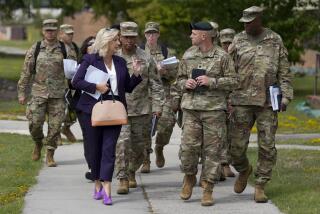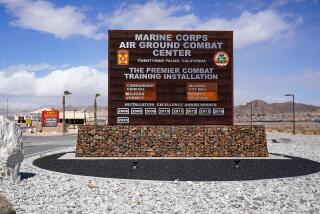<i> Smaller, Fewer</i> Tell Future, Says Marine Lt. Gen.
- Share via
ANAHEIM — The next commandant of the U.S. Marine Corps said Monday that the nation’s armed services will face dramatic changes in coming years, and he urged the Marines and Navy to further integrate forces to maximize power and make up for what will be inevitable cuts in troops and equipment.
Lt. Gen. Carl E. Mundy Jr., 55, said in remarks prepared for the annual meeting of the Navy League of the United States in Anaheim that the Navy’s longstanding focus on preparing for battle at sea with the Soviet Union has been “moderated” to recognize that future wars will probably be regional conflicts fought on land, as the Persian Gulf War was. To project military power rapidly and forcefully will require an integrated force aboard ships.
The ships “are sea bases from which we can manage things around the world,” said Mundy, who will replace Gen. Alfred M. Gray as commandant on July 1.
They will be bases from which Marines, their aircraft and landing craft will be deployed for action. In the Persian Gulf War, thousands of Marines and tons of equipment were stationed aboard Navy ships that sat off the Kuwaiti coast for months.
“We’ve got to make sure we focus on the realities of the future,” Mundy said at the gathering, which was at the Anaheim Marriott.
“We will be smaller,” Mundy said, summarizing a white paper recently written by the secretary of the Navy and the commandant of the Marine Corps that outlines the future of the Navy, which includes the Marine Corps.
“We will have fewer ships and we will have fewer Marines and we will have fewer airplanes. Generally speaking, the numbers in the armed forces are going to come down,” Mundy said in what were his first public remarks since President Bush earlier this month named him the 30th Marine Corps commandant. He is expected to be confirmed by the U.S. Senate shortly.
Mundy is currently the commanding general of the U.S. Atlantic Fleet Marine Force, based in Norfolk, Va., which is responsible for the European operations. It is one of two major field commands in the Marine Corps.
As commandant of the Marine Corps, Mundy will be at the helm of the 200,000 Marines and bases in Japan, Hawaii and the United States, including the stations at El Toro, Tustin and Camp Pendleton.
In a later interview with The Times, Mundy said Congress has a mandate to “downsize the force” in order to operate more affordable armed services.
Because of the tremendous military success of Operation Desert Storm, Mundy said, the defense cuts will not be as drastic as they might otherwise have been. He said the public was able to watch the latest military technology in action in Iraq and see that taxpayers’ money built equipment that worked with stunning effectiveness.
“But we are going to downsize, and, yes, that will be the most difficult part. Because we have good and valid reasons for the Marine Corps . . . being about the size and the composition it is,” Mundy said, noting that Marines’ primary function is to reach the battlefield first and be ready to fight when they get there.
When Mundy takes over as commandant, he will have advanced from the rank of colonel to four-star general in less than 10 years. There are only two four-star generals in the Marine Corps--the commandant and the assistant commandant.
Mundy, who is a graduate of Auburn University in Alabama, is a 34-year Marine Corps veteran. He served in Vietnam in 1966 and 1967 as operations and executive officer in the 3rd Battalion, 26th Marines, 3rd Marine Division, and later as intelligence officer in the headquarters of the 3rd Marine Amphibious Force. He was hit by a round of mortar fire at Khe Sanh and was awarded a Purple Heart. Mundy said he was hit “when I was standing and probably should have been sitting.”
In regard to other concerns, Mundy said the Marine Corps is faced with a problem of replacing its medium lift helicopters such as those stationed at Tustin that are used to move Marines from ships to shore or from one position to another on land.
More to Read
Sign up for Essential California
The most important California stories and recommendations in your inbox every morning.
You may occasionally receive promotional content from the Los Angeles Times.













